Hyundai Bayon vs Mazda 2 Hybrid – Differences & prices compared
Compare performance, boot space, consumption and price in one view.
Find out now: which car is the better choice for you – Hyundai Bayon or Mazda 2 Hybrid?
The Hyundai Bayon (SUV) comes with a Petrol engine and Manuel or Automatic transmission. In comparison, the Mazda 2 Hybrid (Hatchback) features a Full Hybrid engine with Automatic transmission.
When it comes to boot capacity, the Hyundai Bayon offers 411 L, while the Mazda 2 Hybrid provides 286 L – depending on how much space you need. If you’re looking for more power, decide whether the 100 HP of the Hyundai Bayon or the 116 HP of the Mazda 2 Hybrid suits your needs better.
In terms of consumption, the values are 5.40 L per 100 km for the Hyundai Bayon, and 3.80 L for the Mazda 2 Hybrid.
Price-wise, the Hyundai Bayon starts at 20100 £, while the Mazda 2 Hybrid is available from 21400 £. Compare all the details and find out which model fits your lifestyle best!
Hyundai Bayon
The Hyundai Bayon is a compact crossover that effortlessly merges practicality with modern design. Its sleek exterior and spacious interior make it an ideal choice for urban settings and longer journeys alike. With a focus on comfort and connectivity, this vehicle provides a smooth driving experience paired with advanced technology features.
details @ hyundai.news
@ hyundai.news
 @ hyundai.news
@ hyundai.news
 @ hyundai.news
@ hyundai.news
 @ hyundai.news
@ hyundai.news
 @ hyundai.news
@ hyundai.news
Mazda 2 Hybrid
The Mazda 2 Hybrid impresses with its sleek design and advanced hybrid technology, making it a strong contender in the compact car category. It offers a refined driving experience with smooth transitions between electric and petrol power, ensuring both efficiency and performance. Inside, the cabin is thoughtfully designed, providing comfort and intuitive controls for a modern driving experience.
details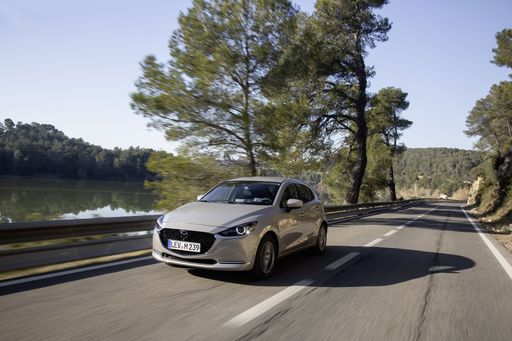 @ de.mazda-press.com
@ de.mazda-press.com
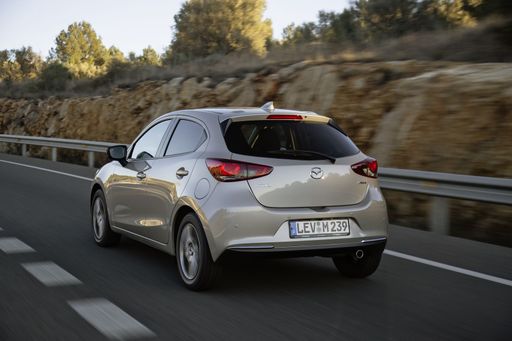 @ de.mazda-press.com
@ de.mazda-press.com
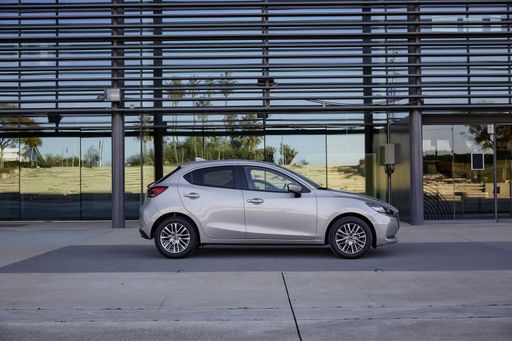 @ de.mazda-press.com
@ de.mazda-press.com
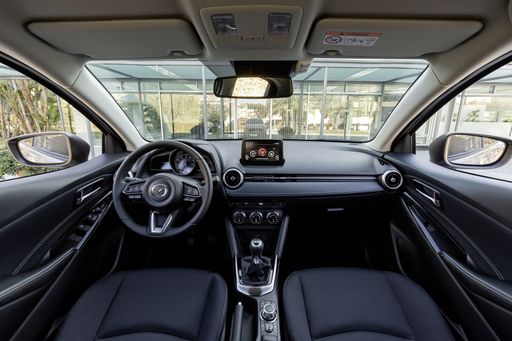 @ de.mazda-press.com
@ de.mazda-press.com
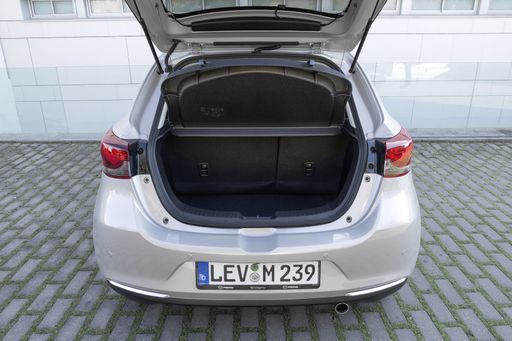 @ de.mazda-press.com
@ de.mazda-press.com

|

|
|
|
|
Costs and Consumption |
|
|---|---|
|
Price
20100 - 25800 £
|
Price
21400 - 28200 £
|
|
Consumption L/100km
5.4 - 5.5 L
|
Consumption L/100km
3.8 - 4 L
|
|
Consumption kWh/100km
-
|
Consumption kWh/100km
-
|
|
Electric Range
-
|
Electric Range
-
|
|
Battery Capacity
-
|
Battery Capacity
-
|
|
co2
124 g/km
|
co2
87 - 93 g/km
|
|
Fuel tank capacity
40 L
|
Fuel tank capacity
36 L
|
Dimensions and Body |
|
|---|---|
|
Body Type
SUV
|
Body Type
Hatchback
|
|
Seats
5
|
Seats
5
|
|
Doors
5
|
Doors
5
|
|
Curb weight
1170 - 1195 kg
|
Curb weight
1180 kg
|
|
Trunk capacity
411 L
|
Trunk capacity
286 L
|
|
Length
4180 mm
|
Length
3940 mm
|
|
Width
1775 mm
|
Width
1745 mm
|
|
Height
1500 mm
|
Height
1505 mm
|
|
Payload
460 - 465 kg
|
Payload
435 kg
|
Engine and Performance |
|
|---|---|
|
Engine Type
Petrol
|
Engine Type
Full Hybrid
|
|
Transmission
Manuel, Automatic
|
Transmission
Automatic
|
|
Transmission Detail
Manual Gearbox, Dual-Clutch Automatic
|
Transmission Detail
CVT
|
|
Drive Type
Front-Wheel Drive
|
Drive Type
Front-Wheel Drive
|
|
Power HP
100 HP
|
Power HP
116 HP
|
|
Acceleration 0-100km/h
11.3 - 12.4 s
|
Acceleration 0-100km/h
9.70 s
|
|
Max Speed
176 - 179 km/h
|
Max Speed
175 km/h
|
|
Torque
172 - 200 Nm
|
Torque
-
|
|
Number of Cylinders
3
|
Number of Cylinders
3
|
|
Power kW
74 kW
|
Power kW
85 kW
|
|
Engine capacity
998 cm3
|
Engine capacity
1490 cm3
|
General |
|
|---|---|
|
Model Year
2024
|
Model Year
2025
|
|
CO2 Efficiency Class
D
|
CO2 Efficiency Class
B
|
|
Brand
Hyundai
|
Brand
Mazda
|
Hyundai Bayon
Introducing the Hyundai Bayon: A New Era in Compact SUVs
The Hyundai Bayon, a compact SUV designed with urban adventurers in mind, is making waves with its exceptional blend of style, performance, and technology. The brand has pulled out all the stops to ensure that the Bayon stands out in the crowded SUV market, offering a vehicle that is both practical and innovative.
Sleek Design and Cutting-Edge Aerodynamics
The Bayon features a striking exterior design, characterised by its bold lines and angular shapes. With a length of 4180 mm, a width of 1775 mm, and a height of 1500 mm, the Bayon commands attention with its modern appeal and aerodynamic efficiency. These dimensions not only contribute to its sleek design but also enhance fuel efficiency, achieving an impressive 5.4 L/100 km.
Engine Performance and Specifications
Under the bonnet, the Bayon is powered by a 1.0-litre T-GDI petrol engine, delivering a robust 100 PS or 74 kW. This engine is available with either a manual or automatic gearbox, meeting varied driver preferences. The front-wheel-drive system complements its urban-centric design, ensuring a smooth and responsive ride.
Maximised Interior Space and Comfort
The spacious interior of the Bayon accommodates up to five passengers comfortably. The vehicle boasts a boot space of 411 litres, perfect for both everyday use and weekend getaways. The cabin is designed with practicality and technology in mind, with intuitive controls and ample storage options.
Advanced Technology and Connectivity
Hyundai has equipped the Bayon with state-of-the-art technology to enhance the driving experience. The SUV features a high-resolution touchscreen, offering seamless connectivity with Apple CarPlay and Android Auto. Safety is also a priority, with multiple driver assistance systems including lane-keeping assist and forward collision avoidance assist.
Environmental Efficiency
Despite its powerful performance, the Bayon achieves a respectable CO2 efficiency class of D, with emissions as low as 122 g/km. This balance between performance and environmental responsibility makes the Bayon an attractive option for conscientious drivers.
Affordability and Market Appeal
The Hyundai Bayon is competitively priced, ranging from €22,900 to €29,600. Its affordable running costs, estimated at 32.3 to 36.4 cents per kilometre, further enhance its appeal to budget-conscious consumers. With monthly costs ranging from €806 to €909, the Bayon provides excellent value without compromising on features or performance.
Final Thoughts
The Hyundai Bayon truly stands out in the compact SUV segment, combining style, innovation, and practicality in an appealing package. It offers a versatile driving experience suited to the demands of modern urban living, making it a top contender in its class. As Hyundai continues to champion forward-thinking design and technology, the Bayon is a testament to the company's ongoing commitment to excellence.
Mazda 2 Hybrid
The All-New Mazda 2 Hybrid: A Leap into the Future of Urban Driving
The 2024 Mazda 2 Hybrid is a testament to Mazda’s commitment to blending innovation and efficiency in a compact package, perfect for urban driving. This hybrid marvel harmoniously balances performance, style, and cutting-edge technology.
Engineered Excellence: Power and Performance
Under the bonnet, the Mazda 2 Hybrid is powered by a full-hybrid system. This sophisticated mechanism combines a combustion engine with electric power, generating a robust 116 PS (or 85 kW). With a responsive acceleration of 0-100 km/h in just 9.7 seconds, this car ensures a dynamic driving experience without compromising fuel efficiency.
Efficiency and Environmental Responsibility
The Mazda 2 Hybrid shines in fuel economy with a noteworthy consumption range of 3.8 to 4 L/100 km. Not only does it offer outstanding efficiency for budget-conscious drivers, but it also projects a responsible attitude towards the environment. With CO2 emissions ranging from 87 to 93 g/km, it holds a respectable B efficiency rating, making it an attractive option for eco-friendly car enthusiasts.
Design and Dimensions: The Compact Urban Companion
With its hatchback design, the Mazda 2 Hybrid embraces both style and practicality. Its compact dimensions—3940 mm in length, 1745 mm in width, and 1505 mm in height—make it ideal for navigating through tight city streets. Despite its size, the Mazda 2 Hybrid offers a comfortable and spacious interior for up to five passengers, complemented by a generous boot capacity of 286 litres.
Technology and Comfort: Innovative Features
The Mazda 2 Hybrid is equipped with a CVT (Continuously Variable Transmission) that offers a seamless driving experience. Advanced features like state-of-the-art infotainment systems and connectivity options ensure both driver and passengers enjoy a connected journey. The model is available in several trim levels, including Centre-Line CVT, Exclusive-Line CVT, Homura CVT, Homura Plus CVT, and Prime-Line CVT, each offering unique features to tailor to various preferences.
Safety and Assurance
In addition to comfort and performance, the Mazda 2 Hybrid prioritises safety. Its robust structure and advanced safety systems deliver peace of mind while traversing urban landscapes. Mazda’s focus on safety innovation ensures each journey is as secure as it is enjoyable.
A Smart Investment: Pricing and Running Costs
With a starting price ranging from €24,990 to €32,890, the Mazda 2 Hybrid positions itself as an attractive choice for those seeking cutting-edge hybrid technology without breaking the bank. Its running costs, including a monthly expenditure between €723 and €855 and a cost per kilometre ranging from 28.9 to 34.2 cents, underscore its economic benefit over time.
Conclusion: The New Benchmark for Urban Hybrids
The Mazda 2 Hybrid represents a harmonious amalgamation of efficiency, innovation, and practicality, tailored for the modern urbanite. As cities continue to evolve, the need for sustainable and versatile transport solutions becomes paramount, and the Mazda 2 Hybrid meets these needs with aplomb, setting a new benchmark for hybrids in its class.
Which drive types are available for the Hyundai Bayon?
Available as Front-Wheel Drive.
The prices and data displayed are estimates based on German list prices and may vary by country. This information is not legally binding.
